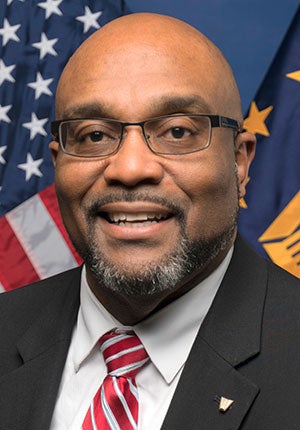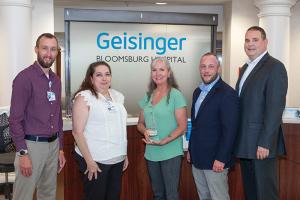From the utility room to the executive suite
Thomas J. Fitzgerald III, CHESP, started off in the environmental services department of the VA Palo Alto (Calif.) Health Care System and worked his way up to director (a government title equivalent to CEO). He offers advice to health facilities professionals seeking to make similar career advances.
What are your thoughts as you take over at the VA Palo Alto Health Care System?
The great opportunity given to me and the enormous responsibility I have in regard to providing world-class health care and services to 93,000 of our nation’s military veterans is on the forefront of my thoughts. I have 7,000 excellent staff and volunteers helping me to meet the mission every day and I want to ensure that they feel engaged and supported and that our veterans have the best experience and outcomes every day.
Did you always think about your next opportunity as you moved up the ranks?
When I first started my career at the Department of Veterans Affairs in 1988, I was a nursing assistant. I worked hard to learn the system and to acquire the skills I needed to prepare for the next competitive promotion opportunity and I received my first promotion after 16 months on the job. I have been promoted 14 times in a 28-year period within the VA. Every time I was promoted, I worked hard to be the best in the position I held by seeking out mentors, stretch assignments and educational opportunities that were instrumental in my professional development and journey. I truly believe you must master the job you have before you seek your next opportunity.
What was your biggest challenge when you moved up to the executive level?
I had to learn not to problem solve everything that came to me. Pulling on my core competency of respect, I worked hard to provide my staff with a psychologically safe work environment that fosters creativity and problem solving at the front lines. I quickly realized that, for the organization to be continually successful, we needed 7,000 heroes versus just one.
Did you learn anything in environmental services that you carried through to your executive career?
Yes, I always credit my 15 years of working in environmental services with enhancing my leadership and customer service skills. In environmental services, you are responsible for the disinfecting, cleaning and aesthetics of every horizontal and vertical surface in the medical facility. With that responsibility comes many potential points of failure and unhappy customers. I quickly learned that my customers’ perception was my reality, and I used the voice of the customer to make needed changes in my department. I still use this feedback in my current position and I also require my staff to do the same thing. Another great skill I developed from environmental services was the ability to respectfully communicate to my staff their value to the organization. I lead from a platform that every position in the facility is equally important and that our success is not based exclusively on the care that the doctors and nurses provide, but on that of the entire team.
How important has your membership in the Association for the Healthcare Environment (AHE) been in your journey?
My membership in AHE has been very important. In fact, I have been a full member since 1997 and a lifetime member since 2003. I also was the president of AHE in 2003 and 2004. Finally, I was one of the 25 inaugural Certified Healthcare Environmental Services Professional (CHESP) test takers in 2000, and am the longest-tenured CHESP in the world.
I find the organization to be very informative and member-centric. There are many benefits of membership such as networking opportunities, continuing education, sharing of best practices as they relate to infection control, aesthetics, and innovative equipment and processes. I would recommend that every member become active and volunteer to help the organization succeed and thrive.
What role has education played in your journey?
Education has had a tremendous impact on my success. I have worked in federal government health care for 34 years. I started my health care career in 1983 as a U.S Army Combat Medic Specialist. During this period, I participated in many formal and informal educational opportunities that relate to clinical and health care operations. I am a graduate of three VA health care leadership training programs, which have provided me with the foundational tools needed to manage in the health care arena. I also have a bachelor’s degree in business with a concentration in health care management; attaining this degree validated my commitment and knowledge as it relates to the profession. I am a lifelong learner and still seek educational opportunities for my staff and myself, because the status quo can stymie an organization.
Can you tell me about any mentors you’ve had along the way?
I have had many mentors throughout my career, but I will talk about two who have been very instrumental in my life.
The first was a wonderful woman named Walter Mae Barnett, who was the housekeeping general foreman at the North Chicago VA Medical Center. Walter Mae hired me as a front-line housekeeper and as the assistant general foreman under her. She provided me with an opportunity to learn while doing the work and was always supportive and positive even when things did not turn out as planned. This allowed me to take risks by challenging the status quo. I have used this approach on employees I have mentored throughout my career. Walter Mae saw something in me that I did not see in myself and she would often say to me that ‘you are going to be a big shot in the VA one day.’ I thank her for seeing and pulling out the best in me.
The other special mentor in my life is Elizabeth (Lisa) Joyce Freeman, the former VA Palo Alto Health Care System director, who was also my past first- or second-line supervisor between 2000 and 2016. I learned so much from her regarding executive health care leadership, and she believed in providing you with educational opportunities, stretch assignments and situational exposure. Lisa would always lead from the front and push you to do the same. She was extremely busy, but she was always available for my numerous mentoring and coaching drive-bys and I feel that her always being there for me made my executive leadership transition easier. I still speak to her as a friend and to bounce things off of her and she still helps me.
What advice would you give to others in hospital operations who want to move up to the executive ranks?
Be committed to your organization’s success by learning the business of the organization and seeking out opportunities for growth. Become data- and outcomes-driven and learn to speak the language of the executives as it relates to decision-making. Treat your staff well and provide a psychologically safe environment at every level. Remember that our staff and patient perception of us is our reality and we need to act on their feedback. Most importantly, be the change that you want to see.




